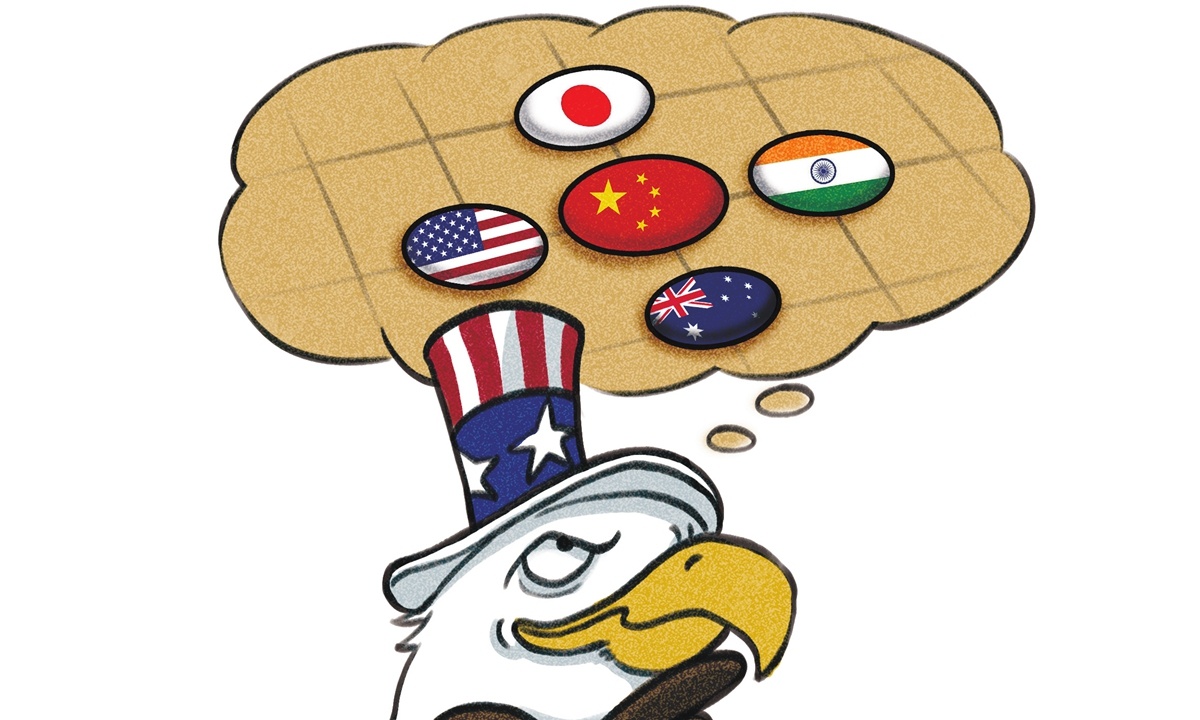
Illustration: Liu Rui/GT
Newly elected Japanese Prime Minister Yoshihide Suga on Sunday had a phone conversation with his Australian counterpart Scott Morrison. This is the first foreign leader Suga spoke to since his inauguration.
What is the intention of Suga's diplomatic move?
The two leaders agreed that as "special strategic partners," Japan and Australia will work to achieve a free and open Indo-Pacific region. They will also build up a stable and prosperous international community. Both leaders expressed their willingness to promote and strengthen bilateral ties. Apparently, Suga hopes to boost "quasi-alliance" relations with Canberra. On the basis of adhering to Shinzo Abe's Indo-Pacific concept, Suga may intend to seek out more anchors for Japan's neighborhood diplomacy.
First, this course of action implies that Tokyo-Canberra defense cooperation will become increasingly close. Previous Japan-Australia meetings mainly involved cooperation in defense and security. The key to realizing Japan's vision for a free and open Indo-Pacific with Australia's cooperation lies in their mutual commitment to the quadrilateral cooperation - which also includes the US and India. It also embodies their aim to counter China on both the South and East China Seas.
As early as 2018, it was reported that Japan and Australia would sign a Visiting Forces Agreement (VFA). The VFA is an agreement between two countries involving military forces visiting each other's territorial. Obviously, it deals with their military cooperation. If signed, deepened bilateral defense cooperation is expected.
Second, Suga is striving to build a close relationship between the US, Japan and Australia. He seeks to enhance Japan's geostrategic control of the Asia-Pacific region. One needs to remember that Japan, in recent years, has said it wants to maintain a common goal of peace and economic prosperity in the Asia-Pacific region, as well as in the world. Tokyo has proactively built the so-called democratic political and security mechanisms based on common values with Western countries.
In terms of Asia-Pacific maritime security cooperation, Tokyo has reinforced its partnerships with Washington and its allies to contain China's maritime activities. Defense ministers from Tokyo, Washington and Canberra hold regular talks regarding Asia-Pacific maritime security. The three countries have agreed to share information and enhance vigilance with joint training on the South China Sea. They view themselves as acting as "defenders" of freedom of navigation and international norms.
By building special strategic partnerships and beefing up security cooperation with Australia through Joint Foreign and Defense Ministerial Consultations ("2+2"), Japan may want to increase its influence with the Abe's proposed "free and open Indo-Pacific" framework.
Third, Trump has adhered to his "America First" policy and asked US allies to defend themselves and shoulder more responsibilities. In such a context, Japan and Australia have strong reasons to get cozy with one another.
Japan wants to use Australia to implement its strategic vision and confront China in specific areas. And Australia wants to find a strategic fulcrum in the Western Pacific. Australia media reported Tuesday that Morrison plans to visit Tokyo as early as November, which will be Morrison's first trip abroad since the outbreak of the COVID-19 pandemic.
With the decline of the US influence in the Asia-Pacific region, Japan and Australia have to work together to prevent a hollow alliance with the US. On the basis of US-Japan and US-Australia alliances, Tokyo and Canberra plan to promote more active communication between the three countries. Japan and Australia believe they need to share the responsibility of Asia-Pacific security for the US.
As the US most important regional allies in terms of strategic and international defense cooperation, the two countries will accelerate their pace in building a quasi-alliance. The two countries will further deepen their "special strategic partnership" in the future. That is clear.
The author is a research fellow of the Institute of Japanese Studies, the Chinese Academy of Social Sciences. opinion@globaltimes.com.cn


